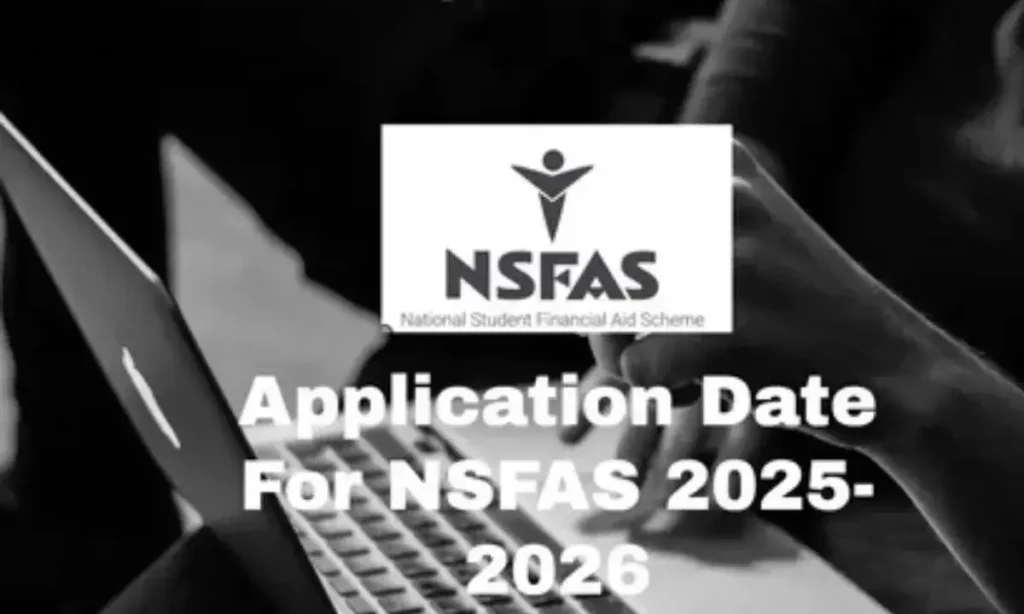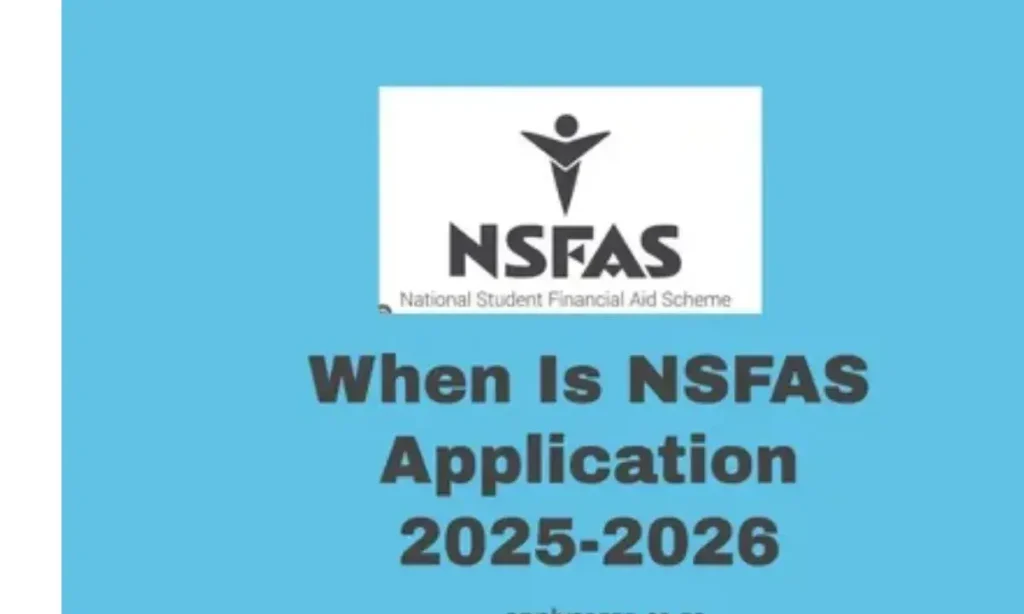The National Student Financial Aid Scheme (NSFAS) is the lifeline for thousands of South African students who dream of higher education but face financial barriers. Each year, NSFAS funds eligible students at public universities and TVET colleges, covering tuition, registration, and living costs.
If you’re planning to apply for the NSFAS online application 2026, you’ll need to know the opening date, closing date, documents required, allowances, and eligibility rules. This guide covers everything — from applying step by step, to tracking your application status, to understanding bursary benefits.
Table of Contents
NSFAS Application Dates 2026
One of the biggest mistakes students make is missing deadlines. NSFAS operates on strict timelines, and late applications are rarely accepted.
- Opening Date: 1 September 2025
- Closing Date: 31 January 2026
Students should apply within this window on the official NSFAS website: www.nsfas.org.za.
The official NSFAS sometimes announces late application dates, but these are not guaranteed. Always aim to apply as soon as applications open.
NSFAS Second Semester Application 2025
Not every student starts in January. Some join in semester 2. For 2025, the NSFAS second-semester applications open from:
- 9 July 2025 to 26 July 2025
Who can apply?
- First-time applicants starting a course in the second semester.
- TVET college students with mid-year enrollments.
- University students only if the institution allows mid-year intake.
Tip: Always check with your university or college before applying for second-semester funding, as not all courses allow it.
How to Apply for NSFAS Online 2026
The application process is completely online through the myNSFAS portal. Here’s a clear breakdown:
Step 1: Create a myNSFAS Account
- Visit my.nsfas.org.za.
- Register with your South African ID number, email, and cellphone number.
- Set a password and activate your profile through an SMS or email verification link.
Step 2: Log in and Start Your Application
- Select “Apply.”
- Provide personal details, academic information, and household income details.
Step 3: Upload Required Documents
- Attach scanned certified documents (see full checklist below).
Step 4: Submit and Track Application
- Double-check all details before submission.
- Keep your reference number for tracking status.
Documents Needed for NSFAS 2026 Application
To avoid delays, applicants must upload the correct documents. Here’s the official checklist:
| Required Document | Who Must Submit | Notes |
|---|---|---|
| Certified copy of applicant’s ID | All applicants | Smart ID card/book accepted |
| Parent/Guardian ID | If dependent | Required for means test |
| Proof of income (not older than 3 months) | Parents/guardians earning income | Payslips, affidavits, tax returns |
| SASSA letter | SASSA beneficiaries | Automatically qualify |
| Proof of residence | All applicants | Utility bill/affidavit |
| Matric certificate / latest results | First-time applicants | To prove academic eligibility |
| Medical certificate | Students with disabilities | To qualify for higher income threshold |
💡 Certification Reminder: Documents must be certified by a commissioner of oaths within the last three months.
NSFAS 2026 Reapplication and Registration
- Who must reapply?
- Students who were rejected previously.
- Students who had funding cancelled.
- Students returning after a gap in studies.
- Who doesn’t reapply?
- Continuing students who meet academic progression rules (50% pass rate).
- Students who remain within the household income threshold.
👉 Each year, funded students must still confirm registration through their university or TVET institution, even if they don’t reapply.
How to Upload Documents on NSFAS
Many students get stuck here. Follow these steps:
- Log in to your myNSFAS account.
- Go to “Upload Supporting Documents.”
- Select the document type (ID, income proof, etc.).
- Upload scanned PDFs/JPEGs (file size limit: 5MB).
- Submit and confirm successful upload.
⚠️ Common Errors:
- Uploading blurry or uncertified documents.
- Using expired certifications.
- Wrong document type (e.g., birth certificate instead of ID).
How Long Does NSFAS Take to Respond?

The response time varies, but here’s what to expect:
- Initial confirmation: Within 24–48 hours after submission.
- Evaluation process: 6–8 weeks on average.
- Final outcome: Usually released before the academic year starts.
Application Statuses Explained
- Application in Progress – Still under review.
- Provisionally Funded – Waiting for institution to confirm registration.
- Awaiting Evaluation – Documents being checked.
- Approved – Funding granted.
- Rejected – NSFAS provides reason; you may appeal.
NSFAS Bursary Coverage 2026
The NSFAS bursary isn’t just tuition; it covers multiple expenses.
What NSFAS Covers:
- Tuition fees – Full coverage.
- Registration fees – Paid upfront to the institution.
- Accommodation – Costs vary by area (see allowance table below).
- Transport – Daily travel costs up to 40km.
- Meal allowance – Monthly food support.
- Learning materials – Books and study equipment.
- Personal care allowance – For hygiene and living essentials.
NSFAS Allowances 2026
Allowance structures differ between universities and TVET colleges.
University Student Allowances 2026
| Allowance Type | Amount (Annual) | Notes |
|---|---|---|
| Accommodation (urban) | R66,500 | Covers rent in city areas |
| Accommodation (peri-urban) | R47,000 | Medium-sized towns |
| Accommodation (rural) | R41,000 | Rural community areas |
| Transport | R7,875 | For students traveling ≤40km |
| Living/Meals | R15,000 | Monthly distribution |
| Books/Study materials | R5,460 | Paid once per year |
| Personal Care | R3,045 | For hygiene and essentials |
TVET College Student Allowances 2026
| Allowance Type | Amount (Annual) | Notes |
|---|---|---|
| Accommodation (urban) | R24,000 | City-based colleges |
| Accommodation (peri-urban) | R18,900 | Smaller towns |
| Accommodation (rural) | R15,750 | Rural areas |
| Transport | R7,350 | ≤40km radius |
| Meals | R6,000 | Monthly food allowance |
| Personal Care | R2,900 | Hygiene and essentials |
NSFAS Eligibility 2026
To qualify for the 2026 cycle, you must meet the following requirements:
General Criteria
- South African citizen or permanent resident.
- Household income below R350,000 per year.
- Household income below R600,000 per year (students with disabilities).
- Enrolled at a public university or TVET college.
- First undergraduate qualification.
Automatically Eligible
- All SASSA grant beneficiaries.
Non-Eligible Applicants
- Students with previous qualifications.
- International students.
- Students in private colleges/universities.
- Part-time students.
- Students who repeatedly fail academic progression.
NSFAS 2026 Updates and Changes
Each funding year brings adjustments. For 2026:
- Household income threshold remains unchanged.
- Allowances increased slightly to keep up with inflation.
- More focus on TVET students with rural accommodation support.
- Stricter monitoring of academic progression (50% pass).
Frequently Asked Questions
Is the 2026 NSFAS application open?
Yes. It opens on 1 September 2025 and closes on 31 January 2026.
What documents do I need for NSFAS?
ID, proof of income, proof of residence, academic results, and SASSA letter (if applicable).
How do I apply for NSFAS?
Create a myNSFAS account, complete the online form, upload documents, and submit.
Which courses are funded by NSFAS in 2026?
All undergraduate programs at public universities and TVET colleges. Postgraduate studies (except limited PGCE, LLB, etc.) are not funded.
How do I apply for NSFAS for the first time?
Register on myNSFAS, follow the step-by-step application process, and submit documents.
Can I apply for NSFAS using my phone?
Yes. NSFAS applications can be completed via mobile devices.
What is the next step after “Application in Progress”?
Wait for evaluation, upload any requested documents, and track updates until status changes.
How to Cancel NSFAS Application
Sometimes applicants need to withdraw:
- Log into myNSFAS.
- Navigate to “Cancel Application.”
- Select a reason for cancellation.
- Submit request.
After cancellation, you can reapply in the next cycle if you still qualify.
Conclusion
The NSFAS online application for 2026 is open from 1 September 2025 to 31 January 2026. To secure funding, apply early, prepare your documents correctly, and track your status regularly. Remember — NSFAS doesn’t just cover tuition, it also provides allowances for accommodation, meals, transport, and study materials.

